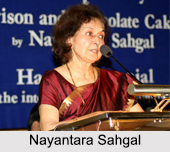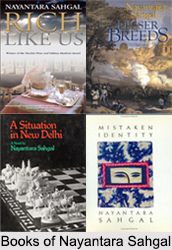 Nayantara Sahgal is an Indian author and is one of the first female Indian writers in English to receive wide appreciation. Her creative writing deals with India"s influential responding to the crises stimulated by political change. She is a member of the Nehru-Gandhi family. Nayantara Sahgal is the niece of former Prime Minister of India Jawaharlal Nehru.
Nayantara Sahgal is an Indian author and is one of the first female Indian writers in English to receive wide appreciation. Her creative writing deals with India"s influential responding to the crises stimulated by political change. She is a member of the Nehru-Gandhi family. Nayantara Sahgal is the niece of former Prime Minister of India Jawaharlal Nehru.
Early Life of Nayantara Sahgal
Nayantara Sahgal was born on 10th May 1927 in a political family. Her uncle, Jawaharlal Nehru was India"s first prime minister and her mother was Vijaya Lakshmi Pandit. Her father, Ranjit Sitaram Pandit was a noted barrister and a literary scholar who translated the famous book "Raj Tarangini" into English from Sanskrit. She attended a number of schools and she graduated from Woodstock School in the Himalayan hill station of Landour, Mussoorie in 1943 and later she studied in the Wellesley College of United States.
Career of Nayantara Sahgal
Nayantara Sahgal served as an advisor to Sahitya Akademi"s Board for English from 1972 to 1975. She was a member of Verghese Committee for Autonomy to Radio and Television in 1977-78. In 1978, she was member of the Indian delegation to U.N. General Assembly. She has also held the post of Vice-President of People`s Union for Civil Liberties.
 Nayantara Sahgal first wrote "Prison and Chocolate Cake", an autobiographical memoir about her youth amid the Nehru family. She then turned to fiction, often setting her stories of personal conflict amid Indian political crises. In her fourth novel, "The Day in Shadow", she worked on Indian women struggling in India"s male-dominated society.
Nayantara Sahgal first wrote "Prison and Chocolate Cake", an autobiographical memoir about her youth amid the Nehru family. She then turned to fiction, often setting her stories of personal conflict amid Indian political crises. In her fourth novel, "The Day in Shadow", she worked on Indian women struggling in India"s male-dominated society.
The contrast between the idealism at the beginning of India"s independence and the moral decline of post-Nehru India that is particularly evident in "A Situation in New Delhi". In her novel "Mistaken Identity", her concept of liberation reaches its peak where her female character is a complete rebel.
Bibliography of Nayantara Sahgal
Due to her political background, politics reflects on most of her fictions. The novels of Nayantara Sahgal bring out her thoughts as a writer with feminist disquiets, looking for independent survival of women. She perceives women as victims of conformist Indian society engaged in their expedition for identity. Her writings are as follows:
"Prison and Chocolate Cake" (1954)
"A Time to Be Happy" (1963)
"From Fear Set Free"(1963)
"This Time of Morning" (1965)
"Storm in Chandigarh" (1969)
"The Freedom Movement in India" (1970)
"Sunlight Surrounds You" (1970)
"The Day in Shadow" (1971)
"A Voice for Freedom" (1977)
"Indira Gandhi"s Emergence and Style" (1978)
"Indira Gandhi: Her Road to Power" (1982)
"Plans for Departure" (1985)
"Rich Like Us" (1985)
"Mistaken Identity" (1988)
"A Situation in New Delhi" (1989)
"Relationship" (1994)
"Before Freedom: Nehru"s Letters to His Sister 1909-1947" (edited)
"Point of View: A Personal Response to Life, Literature And Politics" (1997)
"Lesser Breeds" (2003)
Awards of Nayantara Sahgal
Nayantara Sahgal was awarded with the 1986 Sahitya Akademi Award for English, for her novel, "Rich Like Us". She received the "Sinclair Prize" (Britain) for fiction in 1985. She also received "Commonwealth Writers Award" (Eurasia) in 1987. She was also a Fellow of the Woodrow Wilson International Centre for Scholars, Washington from 1981 to 1982. She returned her Sahitya Akademi Award as an action against extremism. She received the Lifetime Achievement Award for her literary works.
Personal Life of Nayantara Sahgal
Nayantara Sahgal has been married twice, first to Gautam Sahgal and later to E.N. Mangat Rai, a Punjabi Christian who was an Indian Civil Service officer. E.N. Mangat Rai died at the age of 87 in 2003 in Dehradun. She is living for many decades in Dehradun. Nayantara Sahgal had 3 children; Nonika Sahgal, Ranjit Sahgal and Gita Sahgal, a journalist and human rights activist.



















